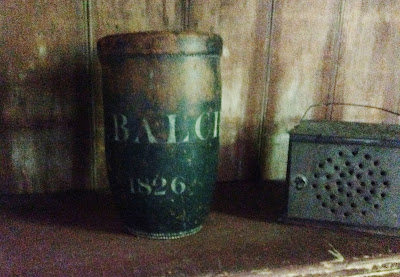The other day, I wrote a post called, I Googled POEM and FITCH POOLE and came up with This. I mentioned that every year I try to find an appropriate poem to use in Bill West's 7th annual Great Genealogy Poetry Challenge. I wanted my poem to have something to do with history or was written by an ancestor or family member. I knew exactly what I wanted when I found it...a poem by Fitch Poole, the first Librarian of the Peabody Institute Library and my 2nd great-granduncle.
Below is the article that came up and from reading it, I saw a poem that interested me, called "The Librarian's Epitaph." A simple click on the active link gave me the poem, but I had to increase the size to 500% in order to transcribe it for easier reading. A nice poem that met my criteria. I hope you enjoy it, although it's long, there is a message for us all. In addition, I posted his cemetery stone below.
For the Wizard
THE LIBRARIAN'S EPITAPH
Here lie the bones of one who lived
In converse with the Sages,
His books he ranged in goodly rows,
And conn’d their title pages,
As in his life with dusty tomes,
His days with book-worms passed,
So now in death by other worms,
He is consumed at last.
The book of Nature he had scanned,
And then pronounced it “Good,”
His loving heart rejoiced to meet
His human brother “Hood,”
He often sought the Hawthorne
bower,
Twas ther “Young”
life began,
Though still a “Child,”
he found the “More”
His growing love for “Mann.”
With “Raikes” he oft was hand and glove,
Yet never felt a strain,
And when he roamed would always take
His “Taylor”
and his “Kane.”
And often he in merry mood,
Amidst his pond’rous romes,
His “Saxe”-horn
blew that he might cheer
Our fireside and our “Holmes.”
O’er history’s varied page he pored
With mingled hopes and fears,
And “Motley”
scenes of peace and war,
Oft moved his eyes to “Theirs,”
While vivid “Sparks”
of modern days
Before his vision float—
Of earlier times of Ancient Greece
He did not care a “Grote.”
He never felt inclined to “Crowe,”
But had a cheerful hope,
No Romanist—but much revered
Both “Abbe,”
“Church” and “Pope,”
Like other men he dreaded “Paine,”
Nor groped he in the dark,
But used to “Illnt” the truth to find
In “Bush” and “Hedge” and “Park.”
Though “Sterne”
and “Savage” in his moods,
He yet was often “Gay,”
And kept his pets in “Moore”
and “Hall,”
His ”Fox,” and
“Drake” and “Jay,”
He’d knowledge from a “Mason” gain
And delve in “Cooper’s”
chips,
But, prudent man, he always kept
A “Locke” upon
his lips.
He kept a “Black-stone,”
on his shelf,
But had no love for “Law,”
And if one told a “story”
well,
He only answered—“Shaw!”
He ground his logic in a “Mill,”
Hard by a sandstone grot,
His “Miller”
was a Scottish bairn
Who always paid his “Scott.”
Of all the “Smiths”
who “Bellows” blow,
With scarcely time to rest,
From “Hudson’s”
banks to wand’ring “Poe,”
He loved his “Goldsmith”
best.
His “Baird” was
cut in comely trim,
His “Head” was turning
“Gray,”
His “Combe” he valued for its age,
And used it every “Day.”
His “Chambers”
where he kept his books,
Were cleaned with nicest care,
And why the “Dickens”
should they not?
He kept two “Trollopes”
there.
And there he kept a might “Brougham”
To sweep away the dust,
That he might Stowe his precious Ware,
And keep it bright from rust.
He kept His “Baker”
and his “Cooke,”
His “Kidd” he loved to cram,
Though “Crabbe”
could never “Tickell” him
He had a taste for “Lamb,”
He loved to Frye
his Pollock brown,
His “Pike” with
“Hook” was taken,
He kept his “Hogg”
in Attic salt,
But could not save his “Bacon!”
His life was passing “Swift”
away
His pulse was like the wave,
No doctor’s skill could now delay,
His drumbeat to the grave.
His “Quincy”
had the nursing care,
Which kindly friends provide,
Alas! No friends could cure his “Burns,”
Or help his “Akenside!”
Beneath this stone the “Sleeper” lies,
Himself now bound in boards,
This narrow “Trench”
is all the space,
His dwelling now affords.
Ye men of Science! cease to mourn,
(His better part endures)
But, up and doing, strive to learn
That greater work of “Ure’s!”
 Fitch Poole, librarian and author of the above poem. He and his wife Mary Ann Poor had 9 children.
Harmony Grove Cemetery, (my FAG site)
Salem, Massachusetts.
Family plot.
Fitch Poole, librarian and author of the above poem. He and his wife Mary Ann Poor had 9 children.
Harmony Grove Cemetery, (my FAG site)
Salem, Massachusetts.
Family plot.



























































